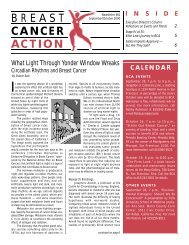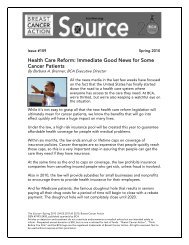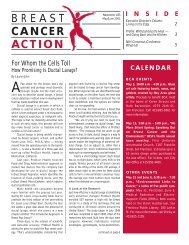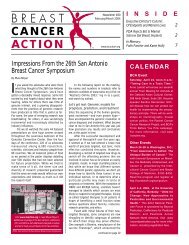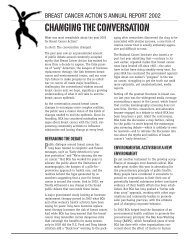BREAST CANCER ACTION - Return to Home Page - Breast Cancer ...
BREAST CANCER ACTION - Return to Home Page - Breast Cancer ...
BREAST CANCER ACTION - Return to Home Page - Breast Cancer ...
Create successful ePaper yourself
Turn your PDF publications into a flip-book with our unique Google optimized e-Paper software.
8 June/July 2006 <strong>Breast</strong> <strong>Cancer</strong> Action<br />
… Universal Access <strong>to</strong> Care<br />
continued from page 1<br />
Access <strong>to</strong> Care: The Numbers<br />
grow up without vaccinations, medical<br />
treatment when they are sick, and regular<br />
checkups <strong>to</strong> assess their health, future<br />
generations will pay the cost.<br />
How Does the U.S. Stack Up Against<br />
Other Countries?<br />
A Commonwealth Fund study on health<br />
systems around the world found that the<br />
United States spends more on health care<br />
than any other industrialized country and<br />
spends the highest proportion of its Gross<br />
Domestic Product on health care. 7 Health<br />
insurance premiums have been increasing for<br />
years, much faster than inflation and wage<br />
increases during the past four years. Despite<br />
all we spend on health care, the United States<br />
has the seventh-highest infant mortality rate<br />
of the 30 most industrialized countries and<br />
ranks 37th in a World Health Organization<br />
assessment of health systems.<br />
The United States is the only wealthy,<br />
industrialized nation that does not have<br />
universal health care coverage. And many<br />
other countries fare better than us on health<br />
outcomes. What are we doing wrong here?<br />
Dr. Alber<strong>to</strong> Manetta, a professor at the<br />
College of Medicine at the University of<br />
California at Irvine, makes an interesting<br />
analogy <strong>to</strong> the U.S. au<strong>to</strong> industry in the<br />
1960s. Power and speed became <strong>to</strong>p design<br />
concerns of U.S. au<strong>to</strong>makers, and many<br />
thought our au<strong>to</strong> industry was the best in the<br />
world at the time. But U.S. design efforts in<br />
efficiency and economy lagged far behind<br />
other countries, and as a result, we are now<br />
◆<br />
◆<br />
◆<br />
7 million Californians are uninsured. Millions more are underinsured.<br />
In 2004, 20 percent of California’s uninsured worked for large employers with at least<br />
500 workers.<br />
Latinos are more likely <strong>to</strong> be uninsured than other ethnic groups, and about 2.5 times<br />
as likely as whites.<br />
◆ In 2001, people with cancer in the U.S. had average medical debts of $35,878.<br />
◆<br />
◆<br />
◆<br />
In a nationwide study, nearly two-fifths of adults who lacked health insurance for a<br />
year or more reported not being able <strong>to</strong> see a physician when needed in the past<br />
year due <strong>to</strong> cost, and nearly 70 percent of those in fair or poor health reported such<br />
barriers. These barriers were greatest for women, blacks, the unemployed, and those<br />
with low incomes.<br />
A study by researchers at Harvard Medical School found that health care<br />
bureaucracy cost the United States $399.4 billion in 2003.<br />
The World Health Organization ranked the U.S. health care system 55th for fairness.<br />
References:<br />
Health Care for All—California. Health Care Crisis. www.health careforall.org/healthcare_crisis.html<br />
California Health Care Foundation (2005). Snapshot: California’s Uninsured.<br />
Consumeraffairs.com (2005). Medical Bills Leading Cause of Bankruptcy, Harvard Study Finds.<br />
Retrieved June 15, 2006 from http://www.consumeraffairs.com/news04/2005/bankruptcy_study.html.<br />
John Z. Ayanian, et al., “Unmet Health Needs of Uninsured Adults in the United States," JAMA 2000;<br />
playing catch-up. When the oil shortage of<br />
the 1970s hit, and gas prices soared, many<br />
could no longer afford <strong>to</strong> drive cars with poor<br />
gas mileage. This is even truer <strong>to</strong>day than it<br />
was in the 1970s.<br />
Similarly, many in the United States<br />
currently think ours is the best health care<br />
system in the world. Yet we spend more and<br />
often get less. We are not necessarily seeing<br />
more or better services. A false sense that we<br />
Deficit Reduction Act Threatens Access <strong>to</strong> Medicaid<br />
At press time, BCA received word that, as of July 1, 2006, any U.S. citizens seeking<br />
Medicaid services will be required <strong>to</strong> provide proof of citizenship, under the so-called<br />
Deficit Reduction Act. Current enrollees will also have <strong>to</strong> provide documentation when<br />
they renew their eligibility—which happens yearly. The primary documents accepted <strong>to</strong><br />
prove citizenship under this law are a passport, a birth certificate, or a certificate of<br />
naturalization. These requirements do not apply <strong>to</strong> noncitizens in those states that<br />
provide Medicaid coverage. BCA is strongly opposed <strong>to</strong> this measure, which was signed<br />
in<strong>to</strong> law at the federal level in February 2006. The law will create additional hurdles <strong>to</strong><br />
obtaining health services and care for low-income people and seniors around the<br />
country. The law affects not just new Medicaid applicants, but also the 51 million current<br />
enrollees, who may need <strong>to</strong> renew their eligibility within the next year. BCA will report on<br />
this issue in more detail in a future issue of the BCA Newsletter. For more information on<br />
the <strong>to</strong>pic, visit www.familiesusa.org.<br />
have the best system should not keep us from<br />
being innovative and designing an improved<br />
health care system that serves all of us. All the<br />
other nations with universal health care can<br />
serve as a model for creating the very best<br />
universal health care system right here in the<br />
United States.<br />
Finding a Solution: Access for All<br />
<strong>Breast</strong> <strong>Cancer</strong> Action is supporting SB 840,<br />
the California Health Insurance Reliability Act<br />
(CHIRA), authored by state Sena<strong>to</strong>r Sheila<br />
Kuehl (D-Santa Monica). This bill would<br />
provide fiscally sound, affordable health<br />
insurance coverage <strong>to</strong> all Californians, provide<br />
every California resident the right <strong>to</strong> choose<br />
their own physician, and help control<br />
increasing health-cost inflation.<br />
The plan would involve no new<br />
government spending on health care. The<br />
health care system created would be paid for<br />
by federal, state, and county monies already<br />
being spent on health care, and by affordable<br />
premiums <strong>to</strong> the state that replace premiums <strong>to</strong><br />
insurance companies, deductibles, out-ofpocket<br />
payments, and co-pays now paid by<br />
continued on page 9




